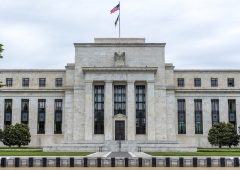Jerome Powell Advocates for Stablecoin Legislation by Year-End
11.07.2024 7:00 1 min. read Alexander Stefanov
During a hearing in front of the House Committee on Financial Services, Federal Reserve Chair Jerome Powell expressed strong support for passing stablecoin legislation before the end of 2024.
Powell emphasized the Federal Reserve’s commitment to working with Congress to create a suitable regulatory framework for stablecoins, highlighting its importance for transaction stability and security in the US.
In April, Senators Cynthia Lummis and Kirsten Gillibrand introduced the Lummis-Gillibrand Payment Stablecoin Act, a bipartisan bill aimed at regulating payment stablecoins. The bill focuses on protecting consumers and fostering innovation while maintaining the dominance of the US dollar.
It defines “payment stablecoins” as crypto assets intended for use as a medium of exchange, redeemable for a fixed amount of US dollars, or maintaining a stable value equivalent to the US dollar, excluding those pegged to non-US dollar assets.
READ MORE:

Jerome Powell Speaks Again on Rate Cuts
The proposed legislation has received mixed reactions. While some praise it for bringing order to the industry, others, like the crypto advocacy group Coin Center, criticize it for potentially stifling innovation. Coin Center CEO Jerry Brito supports the regulation but is concerned about the bill’s impact on innovation and free speech.
-
1
Trump Family Reaches Resolution on Memecoin Dispute, Eyes Major Token Purchase
08.06.2025 14:00 2 min. read -
2
XRP Could Beat Solana to the ETF Finish Line, Analysts Say
12.06.2025 17:00 2 min. read -
3
Plasma’s ICO: A $500M Frenzy Sparks Fairness Debate
10.06.2025 22:00 2 min. read -
4
Dogecoin Stuck in a Holding Pattern – Can Bulls Force a Break Above $0.21?
15.06.2025 16:00 2 min. read -
5
Bitcoin Holds Above $100K, But Analyst Sees Trouble Brewing
07.06.2025 17:00 1 min. read
XRP Price Prediction: Can XRP Hit $4 After XRPL EVM Sidechain Launch?
XRP (XRP) has gone up by 1.2% in the past 24 hours but, behind that mild price increase, there has been a significant spike in trading volumes. During this period, $2.4 billion worth of XRP has exchanged hands, representing an 83% increase. Just hours ago, Ripple announced the official launch of its Ethereum-compatible sidechain called […]
Ethereum Launches Onchain Time Capsule to Mark 11th Anniversary in 2026
A community-driven initiative launched Monday is inviting Ethereum users to lock art, memories, and personal messages inside a decentralized “time capsule,” set to be opened on the network’s 11th anniversary next year.
Ethereum Accumulation Surges While U.S. Politics Stir Market Uncertainty
A new CryptoQuant report highlights a growing divergence between long-term Ethereum holders and short-term Bitcoin buyers, with significant accumulation behavior unfolding in both markets amid increasing political and economic tension in the U.S.
Kazakhstan to Establish State Crypto-Reserve Under Central Bank Oversight
Kazakhstan is taking a major step toward integrating digital assets into its national financial strategy, with plans to establish a state-managed crypto-reserve.
-
1
Trump Family Reaches Resolution on Memecoin Dispute, Eyes Major Token Purchase
08.06.2025 14:00 2 min. read -
2
XRP Could Beat Solana to the ETF Finish Line, Analysts Say
12.06.2025 17:00 2 min. read -
3
Plasma’s ICO: A $500M Frenzy Sparks Fairness Debate
10.06.2025 22:00 2 min. read -
4
Dogecoin Stuck in a Holding Pattern – Can Bulls Force a Break Above $0.21?
15.06.2025 16:00 2 min. read -
5
Bitcoin Holds Above $100K, But Analyst Sees Trouble Brewing
07.06.2025 17:00 1 min. read

